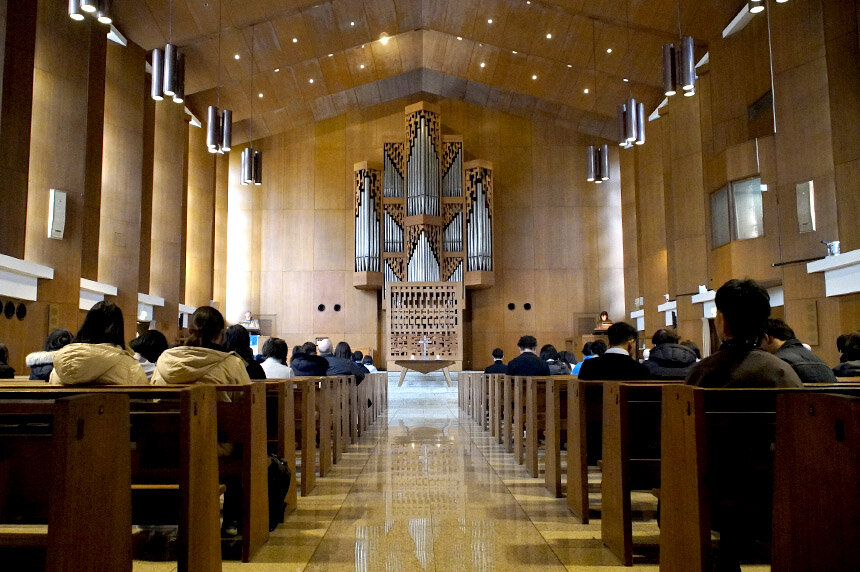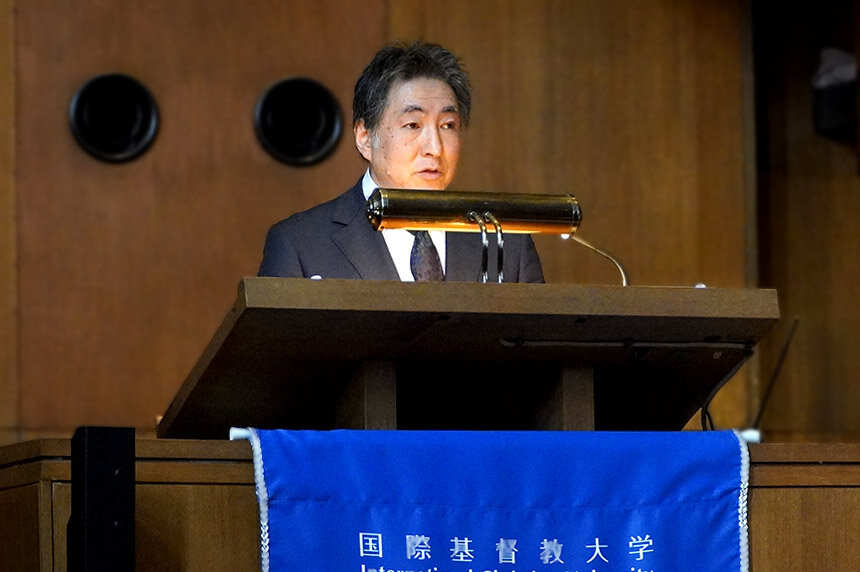NEWS
2024 New Year Chapel Hour
Update: January 12, 2024

The 2024 New Year Chapel Hour was held at the university chapel on Wednesday, January 10, 2024.
The service, presided by Professor Jeremiah Alberg, Acting Director of Religious Center, began with the hymn "Lift up Your Hearts!" by all those in attendance, and continued with a Scripture Reading of Colossians 3:12-15.
Following this, President Shoichiro Iwakiri delivered his message.
Full text of President Iwakiri's message is below.
===

Happy New Year to everyone.
I am delighted to join you today in the Chapel to welcome the new year.
It is with great appreciation for peace that we gather in this place of worship and exchange words as we have done through the years.
And so I began my speech, but in fact, the manuscript for this New Year's service speech was due on December 12th of last year.
The year 2024 began with a calamity that made such words sound inadequate.
As we begin our New Year's service, first, we would like to express our deepest condolences to those who lost their lives in the 2024 Noto Peninsula Earthquake.
We would also like to extend our heartfelt sympathy to all those affected by the disaster, and our thoughts are with those who are in grief for having lost their loved ones, homes, possessions, and items of precious memories. Their anguish must be too deep to be healed. We are praying here for those affected to return to a peaceful daily life, and together, we would like to think about what kind of support we can offer to those facing difficulties in their daily lives.
Last December, I had planned to say the following at the New Year's service.
In a moment of peace, I am hopeful that each and every one of you in the ICU community will continue to take on new challenges, pursuing the path for new discoveries and creations.
I was planning to remark that I suggested at the New Student Retreat last autumn that we contemplate on beauty as a comprehensive theme.
At that time, we did not anticipate this earthquake to occur, but many people all around the world had been in the midst of suffering whom we must keep in our hearts, such as the ongoing war in Ukraine and the fighting between Hamas and Israel, Even now, the number of sufferers is expanding. I've begun to wonder, and I hope you all do as well, if contemplating on beauty under these circumstances is a little unrealistic. What do you think?
An exquisite object is not particularly useful in the practical sense. But I was trying to highlight one aspect: beauty opens up a whole new world for us, shedding light on something that would not have been possible to recognize without it. In this alternative milieu, we encounter moments that bring tender emotions to our hearts.
By way of illustration, when I spot a Japanese honeysuckle in the grass on campus, I feel myself inhaling the luscious bouquet of an ancient poem of love.
You may be critical of my insouciance, in a world full of people torn by wars and poverty. However, if we cannot display luminous and endearing matter in times of peace, the ensuing serenity after the obliteration of war, conflict, and poverty will roll into nothingness.
Peace is inextricably linked with beauty. If the word "beauty" sounds too cliché, try replacing it with happiness in everyday life, or a moment of sheer joy for no apparent reason.
I believe that those in sorrow are grieving the loss of something beautiful: their precious loved ones, treasured memories, delightful moments, and endearing emotions that are irreplaceable to them and to their lives. If a person cannot concretely envision what they truly hold dear in their hearts, no matter how much political righteousness they claim, their words will only be empty.
Even if peace and prosperity exist, if it is a barren peace and mindless prosperity... and if we have nothing for the spirit to discern in times of affluence, our minds will be rendered moribund. The spirit becomes violent, shorn of the tenderness, grace, and affection in our hearts.
That is I intended to tell you for my New Year's service speech.
And I was also planning to say this:
Approximately 30 years ago, just before the bubble economy burst in Japan, some lost their meaning in life and joined a cult that morphed into a fanatic group.
The younger generation may have heard stories from people above the age of 40. 29 years ago, Aum Shinrikyo followers carried out indiscriminate terrorist attacks on civilians using a highly lethal nerve toxin known as sarin gas. That year was also the year of the Great Hanshin-Awaji Earthquake, which had occurred two months earlier, and all over Japan appeared devastated.
In the wake of the Tokyo Subway Sarin Attack, I remember people saying amidst social anxiety that we had perhaps lost something important whilst concentrating solely on an economic upsurge. When expressed verbally, this would have referred to the bond with others, compassion, love and affection.
The ensuing period was dubbed "the lost 30 years" due to the economic stalemate of that era. But I feel that Japanese society may have been able to realize what matters most during this time, and have attempted to reclaim it. That means those years were never just lost, as we sought to steer our consciousness towards a more humane way of life, a society in harmony with nature, with a frame of mind that lays importance on these values.
Japan is currently being criticized for stagnant wages, the weak yen, and low productivity, among other factors. But the memory of that terrifying incident will never allow us to focus solely on economic growth while leaving spiritual wealth behind.
From my point of view, the younger generation today appears to possess a wholesome frame of mind to safeguard their mental wellbeing. Of course, not all of them, but it appears to me that the behavioral style in which everyone cooperates to achieve goals, rather than one individual winning alone, the desire to create a world free of discrimination, and awareness of the importance of protecting the natural environment are all widely shared.
Because of that, I cannot help but wish our society will improve upon its strengths and our endeavors at ICU to be open-minded and bighearted.
❊
Now that I mentioned about 30 years ago, I was planning to further ask you what do we see when we place this 30-year time span in the future?
George Orwell wrote his novel 1984, which criticized totalitarianism, in 1949.
Stanley Kubrick directed 2001: A Space Odyssey, a movie released in 1968, exploring big questions about artificial intelligence, space exploitation, and human evolution. Both men imagined a life 35 years ahead.
The years in the titles belonging to the future have now passed. That is true for the years, but the novels' content, which was titled with those years and stressed the futuristic stories to come at the time of its publication, not a story about the present, remains fresh to this day.
The worlds of 1984 and 2001: A Space Odyssey are still posing big questions to us now, unchanged in the year 2024, regardless of the year, because both "1984" and "2001" are concepts dealing with the future civilization. The two opuses address significant themes about humanity, such as the surveillance society, simplification of words, and artificial intelligence, all of which are universal issues still pertinent in 2024. What does it mean for a person to be human? What can we achieve with technology? The terms of reference they provide when we think about these topics are timeless and remain with us through the ages.
❊
This year is 2024: approximately 35 years from today, it will be 2060. What kind of society would you envision with the title "2060"?
As a University of Tomorrow, ICU has myriad new plans in its vision of tomorrow, which has a large span of time. In fact, we will tackle a variety of initiatives, including a project to learn and think about the natural environment, food and agriculture, a project on reconciliation, a closer collaboration with JICUF, and the implementation of new methods of support for students forced to leave their home countries to seek asylum.
I would be most happy to implement these efforts to further enhance the liberal arts at ICU by working together with the campus community without being hindered by precedents.
Let us pray.
Dear God, let our deeds be in accord with your will, and not to serve our narrow self-esteem. We pray that you will take what is good and make it better, and may you be with us in every breath. In the name of the Father, the Son and the Holy Spirit, Amen.
